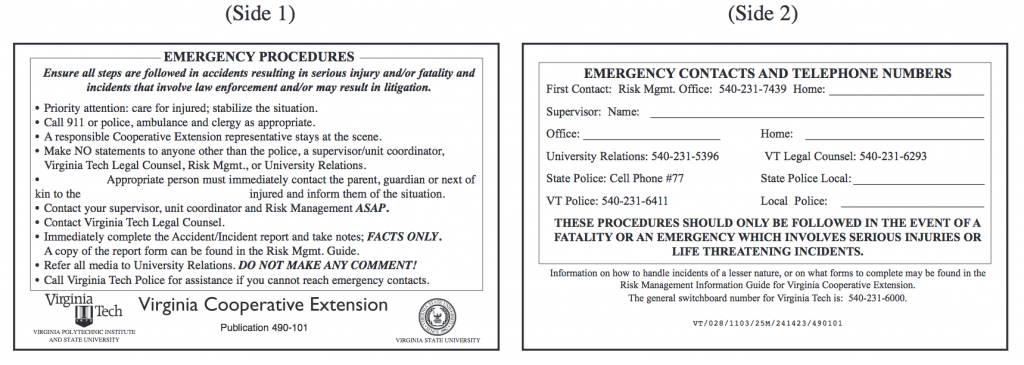Forms & Resources for Coordinators
New! August 2025: Safety and Risk Management for EMGS (SPES-699) and Project Guidelines and Proposal (SPES-700) (previously “Project Proposal and Authorization”)
Program Fee
- Program fee guide – information on collecting fees, handling funds, and getting handbooks -PDF (Updated Dec 2024)
Standard Operating Procedures and Best Management Practices
- SOP for EMG Transfers between VCE Units (Internal Transfers)
- SOP for EMGs from Out of State (External Transfers)
Volunteer Policies
- Volunteer Standards of Conduct – PDF
- VCE Pesticide Policy Statement #93-001 (revised 2024) – PDF
- Required Trainee/intern Enrollment & Agreement – .docx
Re-enrollment
- 2025 Re-enrollment guide – PDF (Updated 10-3-24)
- Required Annual Re-enrollment & Agreement – .docx (Use paper form in cases where people don’t have easy access to internet or a mitigating circumstance that prevents use of Better Impact)
- 2025 Re-enrollment Training Webinar for Coordinators (Nov 2024)– recorded webinar
Volunteer application and optional forms
- Volunteer Application – PDF
- Volunteer Interview Guide (updated 2022) – Google Doc
- Sample Questions for Volunteer Reference Checks – PDF
- Optional Interests & Skills Questionnaire – .docx Please feel free to use or adapt the Interests and Skills Questionnaire. This can be included with the initial application to help in pairing potential volunteers with mentors or ongoing projects.
- Example Application with Interests & Skills Questionnaire, letters for references included – PDF Courtesy of Henrico County
Background Checks (Sterling)
- Sterling Explanation from the EMG State Office -PDF (Updated 2-18-22)
- Sterling Frequently asked Questions – Google Doc (Updated 12-9-24)
Better Impact
- Better Impact Coordinator Guide – Google Folder
- Better Impact Volunteer Guide – PDF
- Training recording for Better Impact Admins from early 2021 – Video
- Beginner-level training for administrators, May 16, 2022 – Video
- Advanced training for seasoned administrators, May 17, 2022 – Video
- Short video on BI reporting, 2021 – Video
- How to resend a background check link, 2025 – Video
Volunteer program planning & evaluation
- Project Guidelines and Proposal – VCE Publication SPES-700 (Updated August 2025, previously “Project Proposal and Authorization”)
Contacts reporting
- Contacts reporting fact sheet -PDF (revised 2022)
Training forms & Templates
- Training speaker evaluation form – .docx
- EMG Training evaluation template – .docx
- EMG Recruitment Emails (Central Shenandoah Valley) – .docx
Media forms/policies
Media release form
- Press and Photo Release – The College of Agriculture and Life Sciences requires that a media release form must be completed for all traditional and electronic media(e.g., photographs, video, audio footage, and testimonials) that are obtained from non-Virginia Tech individuals.
Social media policies
- VCE Social media policy – .pdf – This policy has guidance on things like naming conventions for social media pages, logos, and indicia statements
- Virginia Tech social media policy – .pdf
Risk management documents
- Safety and Risk management for EMGs – VCE Publication SPES-699 (Updated August 2025)
- Request for Certificate of Insurance – Note this form must be filled and submitted for any activity in which official verification of university coverage is issued to third parties. This is a fill-able PDF
- Risk Management Emergency Card – The VCE Emergency Card outlines the procedures to be followed in the event of a “serious accident or emergency.” This card should be carried at all times by VCE staff and volunteers and can be ordered (publication # 490-101)

Examples of memorandums of understanding
Below are three sample Memorandums of Understanding (MOU), which may also be termed Memorandum of Agreement (MOA). These examples may help give you an idea of what items are contained in MOUs that are utilized across the state and help you prepare an outline for creating one with your partnering agency. The following are to be used for example purposes only.
- MOU with early learning center,(PDF)
- MOU with community house,(PDF)
- Garden license with municipality,(PDF)
Volunteer Recognition
You can order blank certificates here. If you need certificates urgently or experience a delay in ordering/mailing, certificate templates are available to print locally here.
As an alternative to handwriting each of your certificates, you can print names on blank certificates using the Word document templates available here. Be sure to try one or two on blank paper first, to make sure things line up on your machine and printer.
Award Ceremonies and Volunteer Recognition Curriculum Package (folder):
- Best Management Practices for Awarding Emeritus status (PDF)
- EMG Award Ceremonies BMP (Google doc)
- List of Award Certificate Templates for EMG Unit Awards (Google doc)
Tree Steward Advanced EMG Program forms
Additional links and resources
- Landscape for Life™ Program, based on the principles of the Sustainable Sites Initiative Program
- Pollinator Partnership. The Pollinator Partnership is a non-profit 501(c)3 organization– the largest organization in the world dedicated exclusively to the protection and promotion of pollinators and their ecosystems. Visit the site for complete information; some highlighted programs are listed below.
- National Pollinator Week
- BeeSmart School Garden Kit
- Highways BEE Act
- USDA Forest Service Wildflower page: Background information on pollinators and wildflowers, resources for children, educators, etc.
- Pollinator Posters -from the website Pollinators of Native Plants by Heather Holm. Download these colorful 8.5″ x 11″ posters for free. Choose posters by specific pollinator, soil type or plant type.
- Educational panels developed by the USDA Forest Service and their many partners on pollinators and wildflowers. Note that some of these resources are very region-specific, so please select those that are applicable to your location.
- i-Tree tool from the USDA Forest Service to help assess and maintain community forests.
